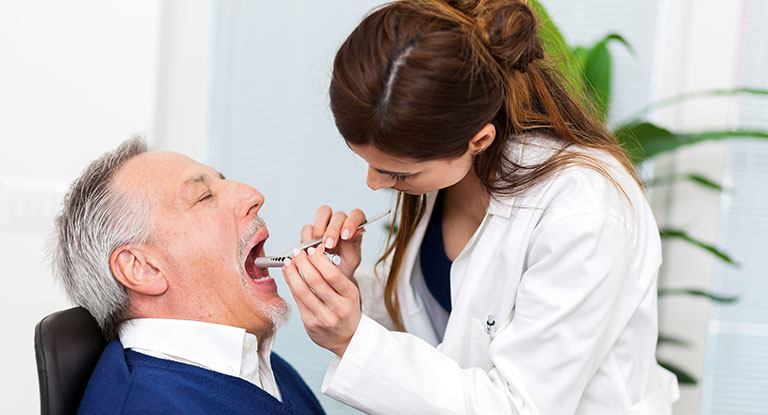

Mouth cancer is the 11th most common cancer in the world, and hundreds of thousands of cases are diagnosed yearly.
A lot of people have heard of cancers affecting other parts of the body, such as the breast, lungs, and colon, and cancer can also appear in the mouth. Cancer of the mouth affects the tongue, throat, cheeks, and lips.
Cancer of the mouth can affect anyone, whether they have their teeth or not and it is more predominant in people above 40 years of age and it affects men more than women. However, recent studies are showing that mouth cancer is becoming more common in younger people and also in women.
More than 640,000 cases of mouth cancers are diagnosed every year worldwide, and it is the 11th most common cancer in the world. Some countries have an increased risk of mouth cancers because of unhealthy lifestyles.
An example is India, where chewing tobacco is common. In the UK, almost 7,800 new cases of mouth cancer are diagnosed every year, and this number is on the increase, in the last decade alone, this number has increased by over half.

Yes, mouth cancer is responsible for many deaths. More than 2,300 people die from mouth cancer every year in the UK alone, and many of these deaths could have been preventable if the cancer was diagnosed and treated early.
And the painful truth is that people with mouth cancer are more likely to die than people with melanoma skin cancer or cervical cancer.
Mouth cancers are mostly caused by alcohol and tobacco. Pipe smoking, cigar, and cigarette are the primary forms of tobacco used all over the world. However, some cultures have a traditional habit of chewing tobacco, paan, gutkha, and betel quid, and these are highly dangerous because they cause mouth cancer.
Alcohol increases your risks of mouth cancer, and the risk is greater if alcohol and tobacco are taken together. Over-exposure to high sunlight can increase your risk of lip cancer. Also, many reports have shown that there is a link between mouth cancer and the human papillomavirus (HPV). This is the main virus that causes cervical cancer, and it also affects the skin that lines the moist areas of the body.
HPV can be transmitted through oral sex, and recent studies suggest that HPV could soon contend with smoking as one of the leading causes of oral cancer. You can reduce your risks of contracting HPV by practising safe sex and limiting the number of partners you have. A lot of people get HPV during their lives, and it does not cause problems for many.
HPV vaccines are available for boys and girls, they were made to help the body fight cervical cancer, but they will likely be used in treating mouth cancers as well. These vaccines are given at the age of 13 or before the onset of sexual activities.
There are different forms of mouth cancers, and they affect different parts of the mouth such as the tongue and lips. It usually appears as a painless mouth ulcer that does not heal, and a red or white patch in the mouth can progress into cancer.
Don’t take lightly any unusual lumps in the mouth or jaw area or if you have persistent hoarseness. See a dentist or a doctor straight away if these areas don’t heal within three weeks for diagnosis and immediate treatment.

Mouth cancer can be spotted in its early stage by a dentist when carrying out a thorough mouth examination. The chances of it being cured are high when it is diagnosed and treated early. A lot of people with mouth cancers go to the dentist or doctor when it is too late, and by this time a lot of damages have already been done.
Examine your mouth regularly — this will help you to be aware of what’s going on inside your mouth. If you notice ulcers that do not heal within three weeks, or there are lumps in your jaw or neck areas, or you have persistent hoarseness, you should see a doctor or a dentist immediately for examination.
This might not be a severe problem, but an early diagnosis can save your life.
The dental team will examine inside your mouth and your tongue using a small mirror. They will also look below your jaw, and your neck region and this examination will be carried out regularly.
This examination is critical because your dental team can see the parts of your mouth that you cannot see by yourself.
If your dentist finds something unusual, you will be referred to a consultant at the hospital to thoroughly examine your mouth and throat. A small sample of the cells in your mouth and throat may be collected, and these cells will be examined under a microscope (a biopsy) to see if there is something wrong.

More tests will be carried out if the cells are cancerous; these may include blood tests, scans, x-rays, and overall health checks. These tests will decide the best course of treatment that suits your case.
Mouth cancer can be cured if it is diagnosed early, and treatment begins immediately. The smaller the area of the ulcer, the faster it can be cured.
However, mouth cancer becomes severe, and many people die from this because they went to the dentist too late and this happens because most people do not have regular mouth examinations.
You can maintain a healthy mouth by quitting smoking and chewing tobacco, reduce the amount of alcohol you take if you drink excessively and have a regular dental examination. Also, eat a healthy and balanced diet always, and fruits and vegetables should make up a significant part of your meals — this will not only protect you against mouth cancer but other types of cancers as well.
We are a dental team located in Harley Street London — we carry out regular dental examinations for our patients, and we also help with the diagnosis and treatment of mouth cancers.
For more information or to book an appointment with our dentist, call 020 71834091 today. We will glad to provide excellent dental services to you.